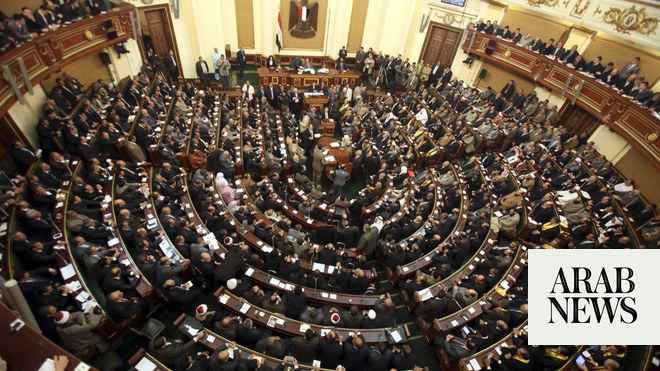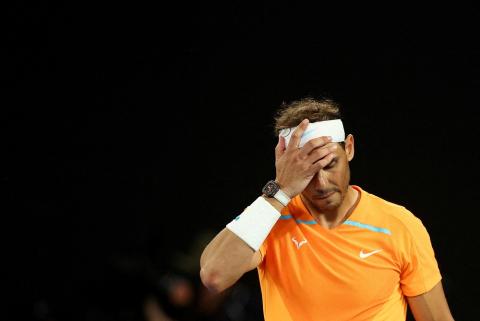
Everyone knows the results are sealed in advance for a single party, whose members will win in a process that’s closer to an appointment than it is to an election
DAMASCUS: Syria held its first municipal elections since 2011 on Sunday, amid tensions with the country’s self-administered Kurdish region, which refused to allow polls.
Turnout was modest at stations in the Syrian capital and candidates aligned with the ruling Baath party were expected to win. The Baath party has controlled Syria’s political and security apparatuses since the 1960s. Hassan Taraqji, a Baath candidate in Damascus, said reconstruction was a top priority for voters after more than seven years of civil war.
“We hope we can meet the people’s aspirations and improve conditions and services in the city,” he said.
The war waged by President Bashar Assad’s regime against local opposition forces and Daesh has cost the country more than $300 billion in economic damage, according to a recent UN study. Observers say more than 400,000 people have been killed.
But parts of the country remain beyond Damascus’ reach, including the US-backed self-administered Kurdish region in north Syria, which also includes Arab and minority populations. The region is governed by its own Syrian Democratic Council (SDC), which refused to allow the Damascus-organized elections to proceed on its territory.
“The regime wants us to remain under its rule and under the rule of the Baath,” said Ibrahim Ibrahim, a spokesman for the administration.
Kurdish officials say they want a federalized Syria that respects the northeast’s autonomy from Damascus and guarantees rights and privileges for national minorities.
High-level meetings between representatives of the SDC and Baath and federal officials in Damascus are yet to produce a breakthrough.
Damascus insists it will assert its authority over the whole country. Hussein Dabboul, a member of Parliament from Aleppo, a north Syrian city near the edges of the self-administration zone, said the SDC was “linked to foreign powers and to the US, and it has certain objectives and targets.”
Pre-war population
Human rights groups have criticized the Kurdish-led administration for single-party rule. The administration held local elections in 2017. More than 40,000 candidates are competing for 18,478 council seats, according to the Ministry of Local Administration. Polls were slated to close at 7 p.m. local time (1600 GMT).
Opposition-held areas were excluded from the polls. Some 3 million people of Syria’s pre-war population of 22 million live under opposition rule in the country’s northwest Idlib province and surrounding areas. Another 5.6 million are refugees abroad; they were also excluded from the vote.
In Damascus, election posters mostly featuring incumbents were plastered across public squares, including in the Old City.
Mohammed Kabbadi, a 42-year-old regime employee, cast his ballot in the Bab Sharqi district of the capital for a candidate from his neighborhood.
“I know exactly who I am going to vote for — he’s young, active and his victory will bring good things to residents of this area,” said Kabbadi.
There appeared to be fewer people heading to the polls than in previous presidential or parliamentary elections, particularly as Sunday was a regular work day.
Still, Syrian pro-Assad television broadcast footage of voters around Damascus and in the coastal regime bastions of Tartus and Latakia dropping their ballots into plastic boxes as election officials looked on. Voting was also under way in areas recaptured by the regime over the past year, including the eastern city of Deir Ezzor, recaptured in full last October by regime troops after fierce battles against Daesh. Mohammed Tah, 36, said he was happy to vote but hoping for an improvement in the city’s ravaged infrastructure.
“I’m optimistic that the incoming council will rebuild and recover the city after the huge destruction suffered by years of fighting,” he said by telephone from Deir Ezzor.
East of the capital Damascus, people trickled into a school being used as a voting center in the town of Jisreen.
Jisreen was overrun by regime troops this past spring as they seized the broader area of Eastern Ghouta from rebels in a blistering two-month assault that left the suburb in ruins.
“These are the first elections that happen in Jisreen since the problems began,” said Abu Haytham, a 64-year-old voter. “We hope these elections will change things for the better, to pave the streets and improve the electricity.” A vast majority of the candidates are members of the ruling Baath party or affiliated to it, which deterred some people from casting their ballot. “Why vote? Will anything change? Let’s be honest,” said Humam, a 38-year-old working in the capital’s Mazzeh district who opted to stay at home on Sunday.
“Everyone knows the results are sealed in advance for a single party, whose members will win in a process that’s closer to an appointment than it is to an election.”
The number of seats had slightly increased from the roughly 17,000 available posts in the last elections, as smaller villages had been promoted to fully fledged municipalities.
Council members serve four-year terms at the municipal level and are mostly responsible for service provision and other administrative matters.
Those elected in this round are expected to have more responsibilities than their predecessors, particularly linked to reconstruction and urban development.
Syria last held local elections in December 2011, just nine months into the conflict.
It held parliamentary elections in 2016 and a presidential vote in 2014 that renewed Assad’s reign for another seven years.












